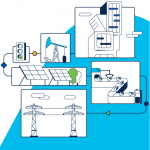Water authorities around the world work to ensure that clean, safe water flows from the sources to customers’ homes. Just as flowing water is key to that mission, so, too, is flowing data. And for a growing number of water authorities – including the Ontario Clean Water Agency in Canada – IoT solutions are providing an innovative way to capture valuable real-time insights into water safety, system efficiency and more.
The Ontario Clean Water Agency delivers operations, maintenance and management services for more than 800 water and wastewater treatment facilities throughout the Province of Ontario. In serving as a “Total Water Solutions Provider,” the agency helps customers meet Canada’s stringent requirements related to monitoring of residual chlorine, floridity and other measures of water quality. Using Cisco IoT solutions, the agency is transforming how it gathers, stores and shares critical compliance data.
Conducting monitoring – and delivering complete, validated data in mandated timeframes – represents a significant challenge. It’s an even bigger challenge given Ontario’s size and the number of water and wastewater facilities that operate at the far corners of the province. With some local operators having to travel three or four hours to reach a facility, the ability to perform remote monitoring has become essential.
When a First Nations community asked for remote monitoring from a central location, the Ontario Clean Water Agency initially proposed using its own proprietary solution. However, this customer was intent on using an independent, standards-based approach. That, in turn, presented a critical challenge: supporting areas with no Internet and spotty cellular service.
For help, the Ontario Clean Water Agency collaborated with Cisco and identified Cisco IoT routing technology with the help of antennas to provide strong cellular connectivity. The agency implemented Cisco 829 Industrial Integrated Services Routers (IR829) in six locations to meet the needs of the First Nations client. These routers, which have become the agency’s new standard, provide highly secure, reliable and easy-to-manage 3G/4G LTE WAN cellular and Wireless LAN connectivity for mobile environments. And because they’re both compact and designed to withstand harsh environments, they’re ideal for connecting IoT devices and applications in virtually any location covered by the agency and its customers.
The solution for the First Nations client uses the Cisco IOx application environment, which combines Cisco IOs and Linux, to support two forms of data collection: local collection inside stainless steel control panels that house the Cisco routers plus integration with the cloud. In fact, the agency can store up to 100 Gigabits of data locally using the Cisco routers inside the steel panels.
“It may seem like overkill to store the data both locally and in the cloud. However, that approach reflects how valuable the data is to our clients. The IR829 routers make it easy for us to have the local backup in the panels,” says the agency’s Director of Operational Systems Ciprian Panfilie. “We haven’t had one failure, and data quality is fantastic.”
Data collection from inside the panels has another important advantage: the ability for local operators to view and analyze their own data, independent of any IT system or cloud provider. And the panels are proving to be fertile ground for other IoT apps that Panfilie and his team are actively investigating.
The successes of Panfilie and his team in Ontario show how flowing information can lead to waves of innovation for water authorities everywhere.
Click here to learn more about the Ontario Clean Water Agency use case.

CONNECT WITH US